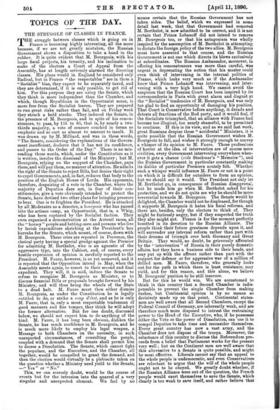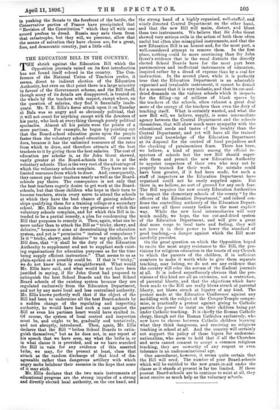TOPICS OF THE DAY.
THE STRUGGLE OF CLASSES IN FRANCE.
THE struggle between classes which is going on in France is becoming highly interesting, all the more because, if we are not greatly mistaken, the Russian Government shows a disposition to take a hand in the rubber. It is quite evident that M. Bourgeois, with his large fiscal projects, his tenacity, and his inclination to make of the electors a Court of Appeal from the Assembly, has at length seriously alarmed the directing classes. His plans would in England be considered only Radical, but in France "the respectables " see in them a "Socialist" bias, they expect to be separately taxed, and they are determined, if it is only possible, to get rid of him. For this purpose they are using the Senate, which they think is more independent than the Chamber, and which, though Republican in the Opportunist sense, is more free from the Socialist leaven. They are prepared to run great risks rather than fail, and on Friday week they struck a bold stroke. They induced the Senate, in the presence of M. Bourgeois, and in spite of his remon- strances, to pass, by 155 to 85, that is, by nearly a two- thirds majority, a vote of censure couched in terms so emphatic and so curt as almost to amount to insult. It was drawn up by M. Milliard, and was in these words, "The Senate, considering the explanations of the Govern- ment insufficient, declares that it has not its confidence, and passes to the Order of the Day." There is no mis- reading those words, which, under the Constitution as it is written, involve the dismissal of the Ministry ; but M. Bourgeois, relying on the support of the Chamber, pays them, and will pay them, no manner of attention. He admits the right of the Senate to reject Bills, but denies their right to expel Governments, and, in fact, reduces that body to the position of the English House of Lords. His opponents, therefore, despairing of a vote in the Chamber, where the majority of Deputies dare not, in fear of their con- stituencies, give a vote obviously intended to protect the Senate, have devised two other plans for bringing pressure to bear. One is to frighten the President. He is attacked by all Moderates as a deserter, a bourgeois who has passed into the artisan camp, an Opportunist, that is, a Whig, who has been captured by the Socialist faction. They even organised a demonstration at the Auteuil races, all the " horsey" people and betting-men and persons who live by lavish expenditure shrieking at the President's box hurrahs for the Senate, which meant, of course, down with M. Bourgeois. These cries are repeated in Provence, the clerical party having a special grudge against the Premier for admitting M. Berthelot, who is an agnostic of the aggressive type, into the Cabinet, and, of course, every hostile expression of opinion is carefully reported to the President. M. Faure, however, is as yet unmoved, and it is reported that the Opposition intend in May, when the Assembly meets again, to resort to their second and final expedient. They will, it is said, induce the Senate to refuse to recognise M. Bourgeois as Minister, or to discuss financial Bills or proposals brought forward by his Ministry, and will thus bring the wheels of the State to a dead halt. M. Faure must then either dismiss M. Bourgeois, as under the Constitution he is legally entitled to do, or strike a coup d'etat, and as he is only M. Faure, that is, only a most respectable tradesman of good manners and fine temper, they think he will adopt the former alternative. But for one doubt, discussed below, we should not expect him to do anything of the kind. M. Faure, it has long been obvious, dislikes the Senate, he has much confidence in M. Bourgeois, and he is much more likely to employ his legal weapon, a Message to both Chambers on the necessity, in such unexpected circumstances' of consulting the people, coupled with a demand that the Senate shall permit him to decree a Dissolution. The Senate, which cannot fight the populace, and the Executive, and the Chamber, all together, would be compelled to grant the demand, and then the election would virtually be a plebiscite taken on the question whether a Ministry need yield to the Senate, —" Yes" or "No."
This, we can scarcely doubt, would be the course of events but for the intrusion into the quarrel of a very singular and unexpected element. We feel by no means certain that the Russian Government has not taken sides. The belief, which we expressed in some detail last week, that that Government had removed M. Berthelot, is now admitted to be correct, and. it is not certain that Prince Lobanoff did not intend to remove M. Bourgeois too, or that his antagonism was wholly inspired by the assumption of M. Berthelot in attempting to dictate the foreign policy of the two allies. M. Bourgeois must have assented to that course, and the Russian Government is not one which directs its blows exclusively at subordinates. The Russian Ambassador, moreover, in offering his remonstrances was more than careful, was urgent in deprecating the notion that his master could even think of intervening in the internal politics of France, which looks very much as if the Ambassador knew that Prince Lobanoff was intervening, and inter- vening with a very high hand. We cannot avoid the suspicion that the Russian Court has been inspired by its correspondents in Paris with great alarm and disgust at the "Socialist" tendencies of M. Bourgeois, and was only too glad to find an opportunity of damaging his position. That Court is Conservative before anything, it dreads and detests all fractions of the Red party, and it would feel, if the Socialists triumphed, that an alliance with France had become too illogical, too nearly shameful, to be permitted to continue. If this is its view, and as we said last week, great Russians despise these " accidental" Ministers, it is quite possible that the Russian Government wishes M. Bourgeois to fall, and wishes it strongly enough to convey a whisper of its opinion to M. Faure. Those professions of horror at the idea of intervention are of course mere civilities, every Government intervening everywhere when- ever it gets a chance (vide Stockmar's " Memoirs "), and the Russian Government in particular constantly making its dislike of particular Premiers acutely felt. Whether such a whisper would influence M. Faure or not is a point on which it is difficult for outsiders to form an opinion, but we should say it would. The President not only let M. Berthelot go, in consequence of Russian disapproval, but he made him go when M. Berthelot asked for his protection, and we do not quite see why he should be more reverential towards M. Bourgeois. The Senate would be delighted, the Chamber would not be displeased, for though it supports M. Bourgeois it hates his fiscal reforms, and there are, besides, only the electors to think of. They might be furiously angry, but if they suspected the truth they also might not. France is for the moment perfectly besotted in its devotion to the Russian Alliance. The people think their future greatness depends upon it, and will surrender any internal reform rather than part with their dreams of triumph over both Germany and Great Britain. They would, no doubt, be grievously affronted by the " intervention " of Russia in their purely domestic affairs, but they have a business side to their heads, and may put up with the affront rather than part with the support for defence or for aggressive war of a million of drilled men. M. Faure, therefore, who generally looks out for the path in which there is least resistance, may yield, and for this reason, and this alone, we believe M. Bourgeois' position to be still insecure.
But for this he would win. We are accustomed to think in this country that a Second Chamber is indis- pensable to prevent the single Chamber from making rushes, but Continental opinion is by no means so decisively made up on that point. Continental states- men are well aware that all Second Chambers, except the Federal Council of Germany, are inherently weak, and are therefore much more disposed to intrust the restraining power to the Head of the Executive, who, if he possesses either the Veto or the power of Dissolution, can use it to compel Deputies to take time and reconsider themselves. Every great country has now a vast army, and the Chamber does not dispose of the troops. Moreover, the reluctance of this country to discuss the Referendum pro- ceeds from a belief that Parliament works for the present very well ; but on the Continent men are well aware that this alternative to a Senate is quite possible, and might be most effective. Liberals cannot say that an appeal to the whole people is undemocratic, and even Conservatives are reluctant to argue that the will of the whole people ought not to be obeyed. We greatly doubt whether, if the Russian Alliance were out of the question, the French people would exert themselves to save the Senate, which clearly is too weak to save itself, and rather believe that in pushing the Senate to the forefront of the battle, the Conservative parties of France have precipitated that "Revision of the Constitution" which they all with one accord profess to dread. Russia may save them from that catastrophe, but they will, we presume, allow that the means of salvation they have chosen are, for a great, free, and democratic country, just a little odd.



































 Previous page
Previous page